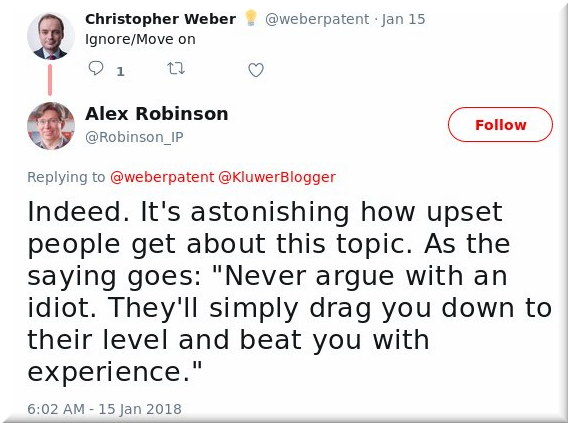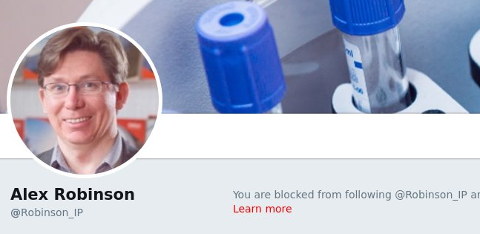

We got that. People who disagree with Alex are "idiots".

Running into hiding, without me even writing anything to him, then calling me names in public.
The EPO will survive, but its status in the world is fast-declining and it's the fault of the management and Team UPC. All they care about is money. They tore down order and justice at the EPO in order to promote their personal agenda. So-called 'reforms'...
"They tore down order and justice at the EPO in order to promote their personal agenda. So-called 'reforms'..."The editor of Managing IP, a longtime booster of the UPC, is still pushing false headlines such as this: "UPC update: German Bar Association says constitutional complaint inadmissible" (false!)
The "Milan" talking point, often used to distract from the Brexit impasse, is again being brought up by Bristows, which a few days ago wrote: "A local division of the UPC will be in Milan" (false again).
No, it will not because there's no UPC. They did not even say "would", they said "will". Surely they know the difference in tenses. They're English.
"The other day we became aware of censorship at Kluwer Patent Blog, courtesy of Alex Robinson from Dehns."As we have shown here before, there is a well-documented and rather long history of deleting comments not favourable to the UPC both in IP Kat and Kluwer Patent Blog (the few sites which permit public comments on such matters but have moderation perpetually enable to prevent the 'wrong' opinions being expressed without approval). This censorship is often done by Bristows. The members of staff who are responsible for this censorship have already been named here.
The other day we became aware of censorship at Kluwer Patent Blog, courtesy of Alex Robinson from Dehns. His post titled "German Bar Association thinks complaint against Unified Patent Court is not admissible" -- a post which started other false reports with similar headlines -- remains uncorrected and he has begun deleting comments that call him out. I happened to catch the above screenshot of how he collectively refers to people as "idiots"; I then found out that he had also blocked me, which is odd as I haven't even spoken to him for a long time. He probably proactively blocked me just so that I can't see what he says or have an opportunity to respond to him.
What has Team UPC been reduced to?
"So Beetz recognises that both the UK and Germany are barriers to the UPC and therefore it's time for the UPC to simply be buried. For people from Bristows and Dehns, however, the only thing to be buried are comments critical of UPC."Meanwhile, a Patent Attorney and Director at Keltie LLP has published "Is it time to bury the UPC yet?"
Keltie LLP's UPC promotion, sometimes using distortion of facts, was noted here before. But Joeri Beetz (the author) is a little more honest than the rest. "Finally," David Pearce wrote, "someone has something sensible and vaguely realistic to say about the UPC..."
Pearce has long been critical of Team UPC. We last mentioned that 1.5 months ago.
From Beetz's write-up:
Just before Christmas, the Preparatory Committee for the Unified Patent Court (UPC) published an online article, looking ahead into this new year. Optimistic as usual, the committee expressed to be "hopeful the New Year will bring closure to [its] endeavours and the Unified Patent Court will become a reality". Some words were spent on the delay caused by the challenges to the German ratification of the Agreement at the German Federal Constitutional Court (GFCC), but most of the article was meant to inform the future users of the unified patent system about the provisional application of the Agreement in the months before the Court will actually start. The article included no words on Brexit and the as yet unclear future relation between the EU and the UK.
[...]
I don't think so. To me, the UPC looked fatally wounded on 23 June 2016 (the day of the referendum) and I haven't seen many signs of life since. However, that doesn't mean that I am ready to bury the idea of a unified European patent yet. For innovative businesses a unitary European patent will save a lot of costs and effort. Only one patent in one language (English only please) will be needed and only one annual renewal fee will have to be paid. Costs and effort that are much better spent on innovation than on legal advice and bureaucracy. Also freedom to operate studies will be easier and more complete when the same claims set is equally valid in the whole of Europe or, even better, in all EPC states.